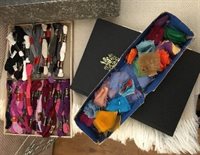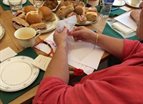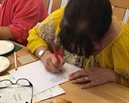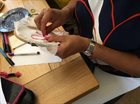Hidden voice: How to give voice to mothers of daughters with Turner Syndrome
Exploring unexpressed feelings regarding threatened fertility using textile craft
Turner Syndrome (TS) is defined as a relatively common chromosomal disorder affecting 1 in 2000 live female births. Cardinal features of TS include short stature and probable infertility.
This project is based on data from Dr Jacqueline Collin’s PhD thesis and focuses on mothers’ descriptions of their sadness, in relation to their daughter’s threatened fertility. It was reported by some as the most devastating part of a diagnosis of TS. Parents expressed concern about how to share this information with their daughters as they grew up. At the heart of decisions about disclosing information were issues about what to share, when, who and how to share sensitive information.

Utilising these narratives, the project team will work with a textile artist to use cloth to interpret this emotive dialogue into something more tangible.The overall aim of the project is to create an art quilt and fabric books as a therapeutic resource to give voice to this deeply sensitive issue; to illustrate a described tension between concealed sorrow and hopes and aspirations for their daughter’s future.
The created artwork will be exhibited locally and nationally to parents, health practitioners, and the wider public providing a therapeutic and educational purpose to the work.
The Workshop:



A workshop with mothers of girls with TS was facilitated by Dr Collin and textile artist Amanda Clayton on 10th September. This interactive workshop presented data from the thesis, stimulating different stories to be shared through sewing, talking, and writing. Drawing these voices together saw the very beginnings of the art quilt created.
This project is a collaboration between KIng's College London's Department of Child & Family Health and Textile Artist, Amanda Clayton. It is supported by the university's Culture team as part of the Early Career Researchers scheme.